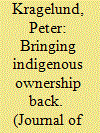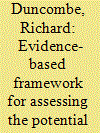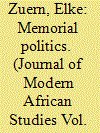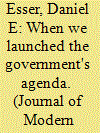|
|
|
Sort Order |
|
|
|
Items / Page
|
|
|
|
|
|
|
| Srl | Item |
| 1 |
ID:
114932


|
|
|
|
|
| Publication |
2012.
|
| Summary/Abstract |
African economies are currently experiencing an upsurge in foreign ownership of key parts of their economies. This, however, is not new, and in the wake of independence several African countries pursued indigenisation policies to bring ownership back to their own citizens. Now indigenisation policies thrive again, this time disguised in terms such as 'empowerment', but just as politicised as in the 1970s. Zambia is at the heart of this development. In the light of liberalisation, booming commodity prices and the increasing importance of Chinese investors, this article seeks to further our understanding of how processes of exclusion interact with domestic politics in Zambia. It argues that the Citizens Economic Empowerment Commission, a new institution to bring ownership back to Zambians, builds on a long tradition of nationalist policies in Zambia, while its actual work is strictly related to the critique of the growing foreign dominance over the economy, and in particular of the upsurge in Chinese investments.
|
|
|
|
|
|
|
|
|
|
|
|
|
|
|
|
| 2 |
ID:
114929


|
|
|
|
|
| Publication |
2012.
|
| Summary/Abstract |
This paper provides a framework-based approach for assessing the potential for mobile finance (m-finance) services to achieve greater financial inclusion in sub-Saharan Africa. The conceptual approach synthesises market and user perspectives, and constructs an evidence-based exploratory framework based on analysis of a single country, Uganda. Case evidence is used to inform four lifecycle stages for m-finance, moving from design to access, usage, and outcomes associated with differentiated m-finance applications. Based on analysis of published sources, findings from Uganda suggest that early adoption of m-finance has favoured those already financially included and market-driven solutions for the financially excluded are limited. Simple market modelling is found to be an insufficient basis on which to assess potential amongst the unbanked majority. The paper argues that the perception, behaviour and capability of users, and forms of user appropriation, should be a paramount concern, and potential for m-finance should be considered within a deeper understanding of a specified financial services context and within a defined market, regulatory and policy environment.
|
|
|
|
|
|
|
|
|
|
|
|
|
|
|
|
| 3 |
ID:
114933


|
|
|
|
|
| Publication |
2012.
|
| Summary/Abstract |
In 2002, Kenya's new National Rainbow Coalition (NARC) undertook to investigate and ensure the recovery of all public lands illegally allocated by the outgoing government. A Commission of Inquiry into the Illegal and Irregular Allocation of Public Land, chaired by the lawyer Paul Ndung'u, was appointed. The commission's report sets out the illegal land awards made to powerful individuals and families, provides important information about the mechanisms by which public land was misallocated, and shows how the doctrine that public land should be administered and allocated 'in the public interest' was consistently perverted. This paper explores what the Ndung'u report tells us about the role of the legal profession in the illegal and irregular misallocation of public land. It makes clear that the legal profession, far from upholding the rule of law, has played a central role in land corruption, using its professional skills and networks to accumulate personal wealth for itself and others. This stands in contrast to the role of the legal profession in promoting good governance and the rule of law envisaged by donors of international development aid. This paper focuses on 'local' land grabbing, and argues that the 'global land grab' or 'investor rush' needs to be understood alongside local manifestations of land privatisation.
|
|
|
|
|
|
|
|
|
|
|
|
|
|
|
|
| 4 |
ID:
114934


|
|
|
|
|
| Publication |
2012.
|
| Summary/Abstract |
Greater international attention to human rights, particularly genocide, has offered activists opportunities to draw on transnational networks and norms. Many examples have been documented of the varying successes of domestic movement organisations employing international support. Much less attention has been paid to cases lacking significant organisations, but small groups and even individuals can draw attention to their demands if they effectively engage transnational interest. Genocide offers a particularly potent means of generating attention. Namibia is engaged in domestic debates over crimes committed by German forces over a century ago. In a country with no large opposition party and no significant social movement mobilisation, a number of relatively small groups of activists are indirectly challenging the power of the dominant party by correcting its one-sided narrative of the country's anti-colonial heroes. German efforts to respond to crimes committed in the past offer further opportunities for activists to draw attention to heroes and histories beyond those celebrated by the dominant party.
|
|
|
|
|
|
|
|
|
|
|
|
|
|
|
|
| 5 |
ID:
114930


|
|
|
|
|
| Publication |
2012.
|
| Summary/Abstract |
Political realities in the capital cities of impoverished countries emerging from violent conflict illustrate how local actors can be hindered in conducting political affairs independently from the interests and influence of national governments as well as international agencies. This experience problematises the argument that the main cause of political impasse in African cities governed by opposition parties is incomplete decentralisation, whereby a devolution of responsibilities is not matched by a downward reallocation of resources. Although resulting competition constrains local governments' opportunities to deliver basic services, we need to look beyond the national scale to uncover the drivers of institutional change and gauge the promise of donor-driven local political empowerment. Urban politics in Africa continues to be shaped by global aid discourses, which are translated into local policy frameworks through interest convergence between international and national actors. The case of Freetown, Sierra Leone provides an illustration of such macro-level alignment and resulting local frictions. At the same time, it also demonstrates how local politics have challenged the technocratic, apolitical reinvention of urban governance in the global South perpetuated by the international aid industry.
|
|
|
|
|
|
|
|
|
|
|
|
|
|
|
|
| 6 |
ID:
114931


|
|
|
|
|
| Publication |
2012.
|
| Summary/Abstract |
This paper investigates gendered patterns of corruption and access to illicit networks among female cross-border traders near the Senegambian border. Despite a discourse of generosity and solidarity, access to corrupt networks is mediated by class and gender, furthering social differentiation, especially insofar as it depends on geographic and socio-economic affinity with customs officers, state representatives and well-connected transporters. Issues of organisational culture, occupational identity and interpersonal negotiations of power represent important sources of corruption that require an understanding of the actual dynamics of public administration. While smuggling depends on contesting legal and social boundaries, the most successful traders (and transporters) strive to fulfil ideal gender roles as closely as possible. Ironically, trading on poverty and feminine vulnerability only works for relatively affluent women.
|
|
|
|
|
|
|
|
|
|
|
|
|
|
|
|
|
|
|
|
|